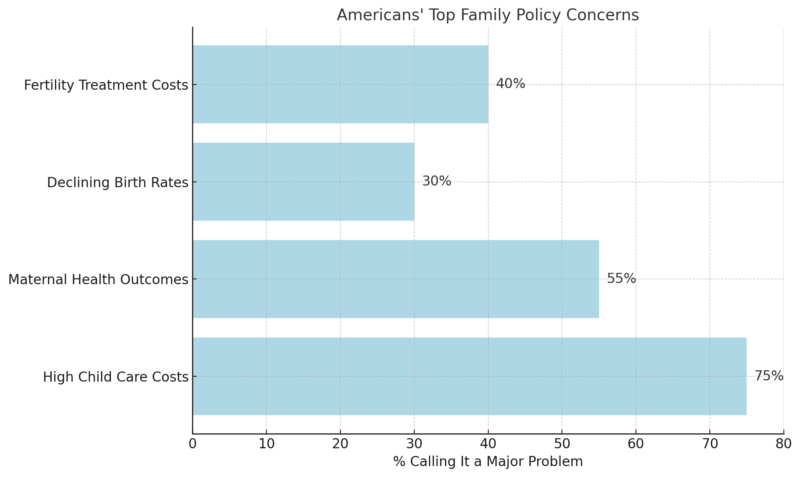WASHINGTON – As the Trump administration floats ideas to encourage Americans to have more children to reverse the nation’s falling birth rate, a new AP-NORC poll finds few adults share those concerns. Instead, most Americans want the government to focus on the soaring costs of child care and improving maternal health.
Pronatalism, the ideology promoting larger families, has gained momentum among tech figures and some religious conservatives. Advocates like Elon Musk and Vice President JD Vance argue that society benefits when families have more children. Yet the new poll reveals these ideas have limited traction with the broader public.
Only about 30% of Americans consider the declining birth rate a “major problem,” while just 12% believe the federal government should prioritize policies encouraging larger families, according to an AP poll.
Table of Contents
ToggleAmericans Focus on Affordability, Not Family Size
Even among Republicans, affordable child care and better maternal health rank higher as priorities than promoting births. This suggests that while conservative leaders may advocate pronatalist policies, there is little urgency among their base to pursue them.
“In this day and age, it’s not dire,” said Misty Conklin, a Trump supporter from Indiana, referring to the declining birth rate. Conklin, 50, believes the government’s focus should be on making it more affordable to raise children, citing the costs involved in caring for her disabled granddaughter. “It’s hard to live as just a couple, let alone with children,” she said.
Americans’ Top Family Policy Concerns

Cost of Child Care Tops Concerns
Child care costs stand out as a top concern for Americans across political lines. About three-quarters of U.S. adults, including 8 in 10 Democrats and 7 in 10 Republicans, view the cost of child care as a major problem. Policies like free or subsidized daycare and paid family leave are popular, with roughly two-thirds expressing support.
Maria Appelbe, a Trump voter in Arizona, described how childcare expenses influenced her decision to leave the workforce to care for her daughter. “I was lucky enough that back in those days, without inflation, we were able to make it work,” said Appelbe, now 49.
Few See Smaller Families as an Issue

Americans remain ambivalent about family size, with weak opinions on whether it is good or bad for families to have fewer or more than two children. While the replacement rate for population stability is 2.1 children per woman, financial realities often lead families to have fewer.
“I’m so glad I was able to give her everything, but if I had more children, I couldn’t have,” Appelbe said of her teenager.
Even though few want the federal government to push larger families, 55% of respondents support prioritizing maternal health outcomes. This view is especially strong among Black Americans and women, reflecting concern over the U.S.’s high maternal mortality rate compared to other developed nations.
Fertility Treatments and Pronatalist Ideas Split Americans
The survey also finds that 40% of Americans see fertility treatment costs as a major problem, and nearly half support requiring insurance coverage for treatments like IVF. Trump, branding himself as the “fertilization president,” signed an executive order earlier this year to expand IVF access, although this move has stirred debate among conservative religious groups.
Bill Taylor, 72, from Washington state, supports mandatory insurance coverage for fertility treatments, citing his daughter’s struggles with health issues and expensive procedures to have a child. While he considers the declining birth rate a minor concern, he acknowledges the complexities:
“Bigger families mean a greater need for government health care and programs,” Taylor said. “Conservatives don’t want to do that. They just want to grow the family.”
Pronatalist policies, such as a proposed $5,000 “baby bonus” supported by Trump, have gained limited traction. Only about a third of Americans support the idea, while roughly 40% oppose it.
Conservative Perspectives
Pronatalist beliefs resonate slightly more with conservatives, though enthusiasm remains limited. About 20% of Republicans believe low birth rates are “mostly bad” for the nation’s future, while most Republicans, like the rest of the public, are more focused on the costs of raising children.
Dmitriy Samusenko, a 28-year-old Californian who identifies as a social conservative but not with a political party, considers the declining birth rate a major issue affecting the country’s future. He supports using government resources to enable families to grow, reflecting a nuanced conservative view on family policy.
Bottom Line
While falling birth rates concern some policymakers, Americans overwhelmingly see child care affordability and maternal health as higher priorities.
This signals that practical support for families, rather than pronatalist policies alone, may be key for any administration looking to address the nation’s demographic challenges while aligning with public concerns.
Related Posts:
- Fewer Babies, Older Populations - How the U.S. and…
- A Tiny Gut Molecule Might Cut Type 2 Diabetes Risk,…
- 10 Years After One-Child Policy Ended, China’s Birth…
- Urgent Care vs. Emergency Room - Costs, Speed, and…
- US States with the Highest and Lowest Dental Care…
- US vs Europe Healthcare in 2025 - Costs, Quality of…








